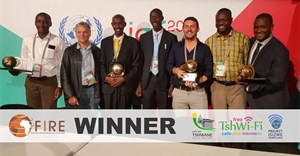#AfricaMonth
Subscribe & Follow
Trending
Elections 2024
Jobs
- Integrated Client Service Lead Rosebank
- Sales Executive White River
- Manager - Marketing and Commercial Cape Town
- Personal Assistant Johannesburg
- Head of Strategy Johannesburg
- Television Business Development Manager Johannesburg
- Junior Digital Business Writer Roodepoort
- Sales and Support Representative Nelspruit
- Magazine Advertising Sales Executive Cape Town
- Journalist Intern Cape Town
Grahamstown media project connects people with power
Well, it's no secret that if you don't sell papers, you might as well chuck it in and go into the business of selling pens. As for papers making money, there's not too many of those any more. Most newspapers break even or only bring in a tidy little profit because they are, in fact, expensive to produce and that is why most are part of big, diversified groups such as Naspers, where the jewel in the crown is satellite TV.
Put more money into the MDDA
Perhaps it is cheeky to point that if the government would like to see more newspapers owned and run by historically disadvantaged people, it would make a good start by putting more money into the Media Development and Diversity Agency (MDDA), to which the print industry contributes. This year, the government gave the MDDA R17 million, its CEO, Lumko Mtimde, told me a few months back - which doesn't go far when you think of the dozens of community radio stations and newspapers out there wanting a slice of the pie.
So it is very interesting to discover that in the little university town of Grahamstown in the Eastern Cape, an innovative citizen-journalism project is already in its second year. Called Iindaba Ziyafika - The News is Coming, it is being funded by American money from the prestigious non-profit Knight Foundation - about R5 million over three to four years - and run by Prof Harry Dugmore, one of the founders of the iconic South African cartoon strip, Madam & Eve.
Dugmore, who left Madam & Eve in 2002, then went into strategy and communications, consulting to the presidency among others, and helped run the Khomanani government HIV/Aids campaign. He applied for the Grahamstown job - called the MTN Chair of Media and Mobile Communication - when he saw it advertised by Rhodes University's journalism school two years ago.
"I've always been incredibly interested in technology and I've always been in communication or journalism of one sort of another since I was pretty young," says Dugmore. "So when I saw this job advertised, I thought: 'Hmm, that looks like it's written for me and I applied and I was lucky enough to get it.'"
First successful citizen-journalism programme
And indeed, he was lucky as this is a really interesting project - the country's first successful citizen-journalism programme.
"Citizen journalism" essentially means getting ordinary people involved in gathering and reporting news - preferably the kind of news that gives marginalised people a voice, the kind of stories that might be hard for mainstream reporters to access and mainstream newspapers would find tricky to give space to.
An example would be what's really going on in a trade union or the hyperlocal problems and successes unique to a particular neighbourhood. The aim is to get some kind of outcome - that is, for a problem to be fixed or to change something - and to increase peoples' participation in the media and, therefore, democracy.
The Internet has largely made citizen journalism possible and in 2006 South African media house Johncom - now Avusa - set up the reporter.co.za citizen-journalism website but it was shut down as there were not enough "citizens" making use of it.
Smaller in scale
Because mobile technology crosses economic boundaries in this country, the Grahamstown project has a particular interest in how cellphones can aid these lofty but very public-spirited aims. It is possibly succeeding - where reporter.co.za failed - because it so much smaller in scale.
It has entailed groups of 30 people at a time getting six weeks basic training in a specially set-up newsroom in the university-owned Grocott's Mail community newspaper. Thereafter, they have access from nine to five to 12 desks with computers with Internet access, as well as to a dedicated citizen-journalism editor for help and advice. The citizen journalists' stories go into Grocott's Mail, for which they get R100 for every published story. The stories also become the basis of citizen-journalism radio shows on Radio Grahamstown.
From these training groups, says Dugmore, a core of about 12 to 18 people has emerged as regular citizen journalists who produce about half a dozen stories in a good week.
If this seems like a rather modest output, one must remember that citizen journalism projects around the world have found that it's far harder to get more than tip-offs from citizen journalists. Reporting is time-consuming and writing stories that are both interesting to readers, as well as balanced and fair, is a skill that takes years to learn. Ask any reporter at a major newspaper how long it took them to master this. (Some never do and their copy is saved by long-suffering news editors and sub-editors forever more.)
Lessons learnt
So is Iindaba Ziyafika worth it? What has Dugmore learned from it all? Among other things:
- That radio is easier for the citizen journalists than print and turns out far livelier and engaging for the audience, not least because it is in vernacular language;
- That the core citizen-journalists' that stuck with it have produced on-the-ground stories that Grocott's would never otherwise have done;
- That is has been difficult to install in the citizen journalists that stories should be balanced, ie dissenting voices are desirable and add - rather than detract - from their credibility; and
- That cellphones are more useful as a receiving device than an input device, ie for the journalists to take pictures with and write stories on. Iindaba Ziyafika is sending out news via mobile with a time horizon and a high degree of participation.
Need for watchdog in society
But, by far, the most important lesson learned in Grahamstown is that the real success has been in helping to make the citizen journalists aware of the need for a watchdog in society.
"People (in South Africa) are so alienated from power because politicians don't want participation," says Dugmore. "They claim they do but they don't. They claim they want scrutiny but they don't really want it.
"Absolutely amazingly, we do all this citizen-journalism work and we get a lot of uphill from political parties, who say: 'How dare you go to people and ask them what they think of our rubbish removal. They vote for us; they will tell us'. And the people on the other hand are saying: 'We're absolutely furious. When the mayor comes here we're going to stone his car.
"So we have the politicians saying: 'We will be the only conduit. We don't need your silly little newspaper to tell us the people are unhappy because the rubbish hasn't been collected'. Well, that's precisely what they need the silly little newspaper to do because they don't otherwise do something. We run the article about the rubbish not being collected and, low and behold, the trucks come on the same day. Something happens... Are they shamed into doing it or reminded to do it? We don't know but that's the power of journalism and reconnecting the people to power."
And that is what the ANC and our government - from the president right down to local authorities - should put in their collective power pipe and smoke before lecturing the media on how to do our jobs. In fact, we know how to do our jobs and, more and more, the people are seeing the value in us doing so.
For more:
- Iindaba Ziyafika website
- Harry Dugmore's very interesting blog about the Iindaba Ziyafika project"Powerful journalism is easy peasy (and here's how to do it)" - Bizcommunity column on innovative civic-journalism project by Daily Dispatch newspaper






















